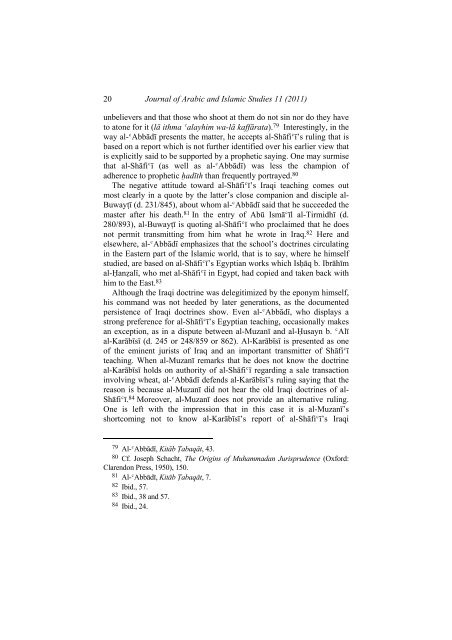JOURNAL OF ARABIC AND ISLAMIC STUDIES
JOURNAL OF ARABIC AND ISLAMIC STUDIES
JOURNAL OF ARABIC AND ISLAMIC STUDIES
Create successful ePaper yourself
Turn your PDF publications into a flip-book with our unique Google optimized e-Paper software.
20<br />
Journal of Arabic and Islamic Studies 11 (2011)<br />
unbelievers and that those who shoot at them do not sin nor do they have<br />
to atone for it (lā ithma ʿalayhim wa-lā kaffārata). 79 Interestingly, in the<br />
way al-ʿAbbādī presents the matter, he accepts al-Shāfiʿī’s ruling that is<br />
based on a report which is not further identified over his earlier view that<br />
is explicitly said to be supported by a prophetic saying. One may surmise<br />
that al-Shāfiʿī (as well as al-ʿAbbādī) was less the champion of<br />
adherence to prophetic ḥadīth than frequently portrayed. 80<br />
The negative attitude toward al-Shāfiʿī’s Iraqi teaching comes out<br />
most clearly in a quote by the latter’s close companion and disciple al-<br />
Buwayṭī (d. 231/845), about whom al-ʿAbbādī said that he succeeded the<br />
master after his death. 81 In the entry of Abū Ismāʿīl al-Tirmidhī (d.<br />
280/893), al-Buwayṭī is quoting al-Shāfiʿī who proclaimed that he does<br />
not permit transmitting from him what he wrote in Iraq. 82 Here and<br />
elsewhere, al-ʿAbbādī emphasizes that the school’s doctrines circulating<br />
in the Eastern part of the Islamic world, that is to say, where he himself<br />
studied, are based on al-Shāfiʿī’s Egyptian works which Isḥāq b. Ibrāhīm<br />
al-Ḥanẓalī, who met al-Shāfiʿī in Egypt, had copied and taken back with<br />
him to the East. 83<br />
Although the Iraqi doctrine was delegitimized by the eponym himself,<br />
his command was not heeded by later generations, as the documented<br />
persistence of Iraqi doctrines show. Even al-ʿAbbādī, who displays a<br />
strong preference for al-Shāfiʿī’s Egyptian teaching, occasionally makes<br />
an exception, as in a dispute between al-Muzanī and al-Ḥusayn b. ʿAlī<br />
al-Karābīsī (d. 245 or 248/859 or 862). Al-Karābīsī is presented as one<br />
of the eminent jurists of Iraq and an important transmitter of Shāfiʿī<br />
teaching. When al-Muzanī remarks that he does not know the doctrine<br />
al-Karābīsī holds on authority of al-Shāfiʿī regarding a sale transaction<br />
involving wheat, al-ʿAbbādī defends al-Karābīsī’s ruling saying that the<br />
reason is because al-Muzanī did not hear the old Iraqi doctrines of al-<br />
Shāfiʿī. 84 Moreover, al-Muzanī does not provide an alternative ruling.<br />
One is left with the impression that in this case it is al-Muzanī’s<br />
shortcoming not to know al-Karābīsī’s report of al-Shāfiʿī’s Iraqi<br />
79 Al-ʿAbbādī, Kitāb Ṭabaqāt, 43.<br />
80 Cf. Joseph Schacht, The Origins of Muhammadan Jurisprudence (Oxford:<br />
Clarendon Press, 1950), 150.<br />
81 Al-ʿAbbādī, Kitāb Ṭabaqāt, 7.<br />
82 Ibid., 57.<br />
83 Ibid., 38 and 57.<br />
84 Ibid., 24.

















